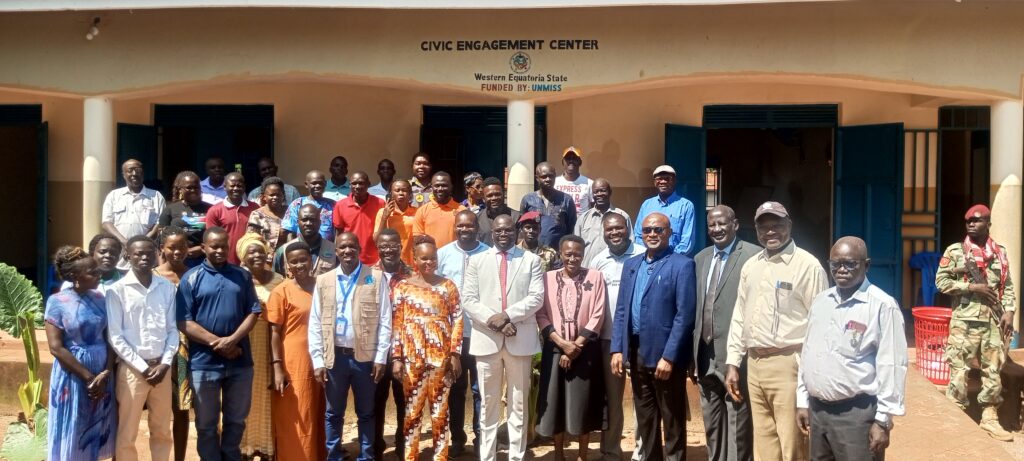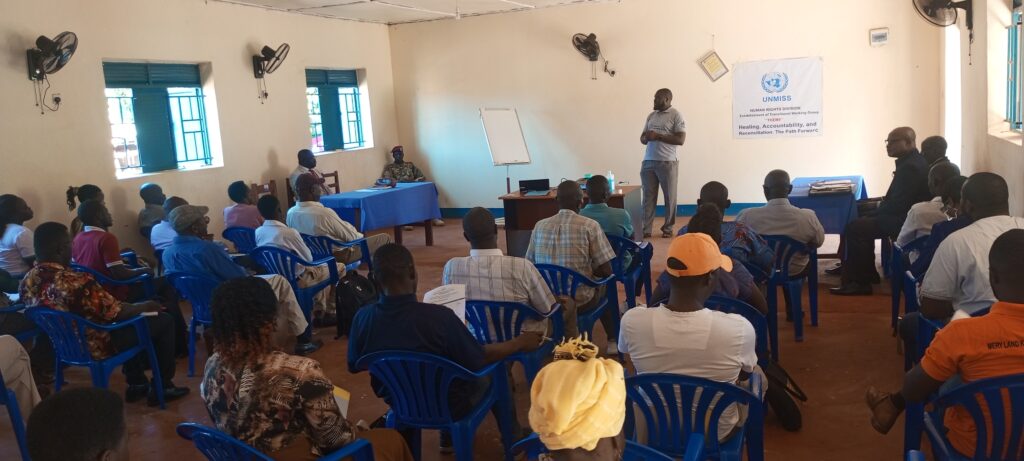

The recent two-day workshop held in Yambio, Western Equatoria State (WES), from
July 17th to 18th, 2025, marked a significant milestone in South Sudan’s
ongoing pursuit of peace and reconciliation. Organized by the United Nations
Mission in South Sudan (UNMISS) Human Rights Division and hosted by the Network
for Civil Society Organizations (NeCSOs) at the Civic Engagement Center, this
event brought together a diverse group of stakeholders committed to advancing
the transitional justice process in the region. Civil Society Organizations
(CSOs) in Western Equatoria played a pivotal role in these discussions,
reflecting their growing influence and dedication to fostering accountability
and healing in a post-conflict society.
The overarching goal of the workshop was to promote
transitional justice mechanisms, crucial tools for addressing past abuses,
fostering accountability, and laying the foundation for lasting peace.
Transitional justice encompasses truth-telling, reconciliation, reparation, and
institutional reforms, all aimed at addressing the grievances stemming from
conflict. The workshop aimed to provide technical assistance to local actors in
establishing and operationalizing these mechanisms, ensuring they are rooted in
the local context and responsive to the needs of communities.
This significant gathering was graced by the presence of
prominent figures, most notably the Acting Governor of Western Equatoria State,
Hon. Badagbu Daniel Rimbasa. As the guest of honor, he officially opened the
workshop and delivered remarks that underscored the importance of transitional
justice. Hon. Rimbasa emphasized that sustainable peace in Western Equatoria
requires a transition from conflict to a culture of peace. “To have a
sustainable peace, we have to transit from war to the culture of peace,” he
stated. He highlighted that healing society is impossible without truth,
reconciliation, and justice, which are intertwined with human rights. His words
resonated deeply with the broader goals of the workshop, stressing that justice
must be enacted where suffering is greatest—especially in county like Tambura,
where innocent women and children continue to die amidst ongoing violence.
The discourse from the representatives of CSOs further reinforced their vital role in the peace process. Mr. Wanga Emmanuel, Chairperson of NeCSOs, expressed gratitude for the active participation of the Acting Governor and witnessed the inauguration of the Civic Engagement Center—a significant step toward civic engagement and community-led initiatives. He urged CSOs to take the workshop seriously, emphasizing that their active involvement and knowledge are crucial for the sustainability of peace and justice in Western Equatoria.
UNMISS’s delegation, led by the Head of Field Office (HoFO), Jane Koni, also underscored the importance of transitional justice. She welcomed participants and highlighted that transitional justice is a cornerstone for post-conflict reconstruction and reconciliation. “It provides a framework for addressing human rights abuses, promoting accountability, and fostering national healing,” she stated. Koni emphasized that the implementation of the Revitalized Agreement on the Resolution of Conflict in South Sudan (ARCSS) is vital, as it lays out a roadmap for transitional justice, including accountability, truth-telling, and reparations for victims.
The workshop’s inclusiveness was notable, involving not just CSOs but also traditional leaders, youth, women’s representatives, members of parliament and people leaving with disabilities. This broad participation reflected a collective acknowledgment that sustainable peace can only be achieved through inclusive dialogue and community ownership of justice processes. Traditional leaders, who hold
